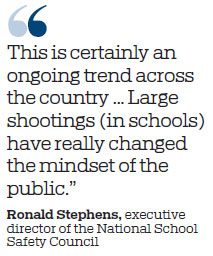More large US colleges hiring armed police to patrol campuses
More colleges in the US are using armed police to patrol their campuses, according to experts and statistics.
Last week, Maryland's lawmakers gave overwhelming approval for Baltimore-based Johns Hopkins University to put a 100-member armed police force on its three campuses, making it the state's first private university with armed officers.
Police forces on US college campuses didn't become widespread and fully professionalized until the late 1960s, when colleges shaken by protests decided to have their own police instead of relying on local law enforcement. Now at least 44 states have laws allowing colleges to form their own police forces.
About 75 percent of the country's public four-year colleges and universities with more than 2,500 students employ armed police, as well as 91 percent of private colleges of that size, according to a 2015 report from the US Justice Department.
Officials at Johns Hopkins fought for the armed police force after lawmakers in the previous legislative session backed off the school's request amid a community backlash.
University officials said the force was needed to help ensure safety after a spate of robberies near its campuses in late 2017. Since 2015, Baltimore also has experienced unusually high violent crime levels, with four straight years of at least 300 homicides.
Opponents criticized the push for more police, saying that many city residents, particularly its large population of blacks, distrust law enforcement and worry about racial profiling.
Supporters of armed police at the school included billionaire alumnus Michael Bloomberg, the former New York mayor. Last year he announced he was giving $1.8 billion to Hopkins.
A group of Hopkins students called Students Against Private Police criticized Bloomberg's remarks. The group said Bloomberg's support for a private, armed police force was at odds with his other work to promote gun control.

A survey by the Bureau of Justice - part of the US Justice Department - found that campus police officers had patrol and arrest jurisdictions in areas bordering campuses at 81 percent of colleges.
"This is certainly an ongoing trend across the country, for not only secondary middle schools and high schools, but also colleges and universities," Ronald Stephens, executive director of the National School Safety Council, told China Daily.
"Large shootings (in schools) have really changed the mindset of the public," Stephens said. "Because it used to be considered if you had a police officer in the school, 'What's wrong with the school?"'
The number of police officers on campuses has grown, agreed Sue Riseling, executive director of the International Association of Campus Law Enforcement Administrators.
Special training needed
She told the Chronicle of Higher Education in May that she suspects that the growth isn't coming so much from large campuses, where she said the number of officers is generally stable, as from two-year institutions, which are adding more traditional officers to their ranks.
Experts say that armed police officers on campuses should be specially trained. "It's not just about having a warm body on the campus, but the real key is how these individuals are trained and prepared to deal with crises and things like de-escalation of incidents," Stephens said.
He said that adding an armed police officer should also create a climate of trust and build relationships with students, besides just going on the campus with a gun to create peace.
"It's important for students to realize how much it's in their self-interest to report rumors and threats," Stephens said, adding that protocols need to be in place in places where students can notify school officials or law enforcers.
ruinanzhang@chinadailyusa.com
(China Daily 04/11/2019 page12)














